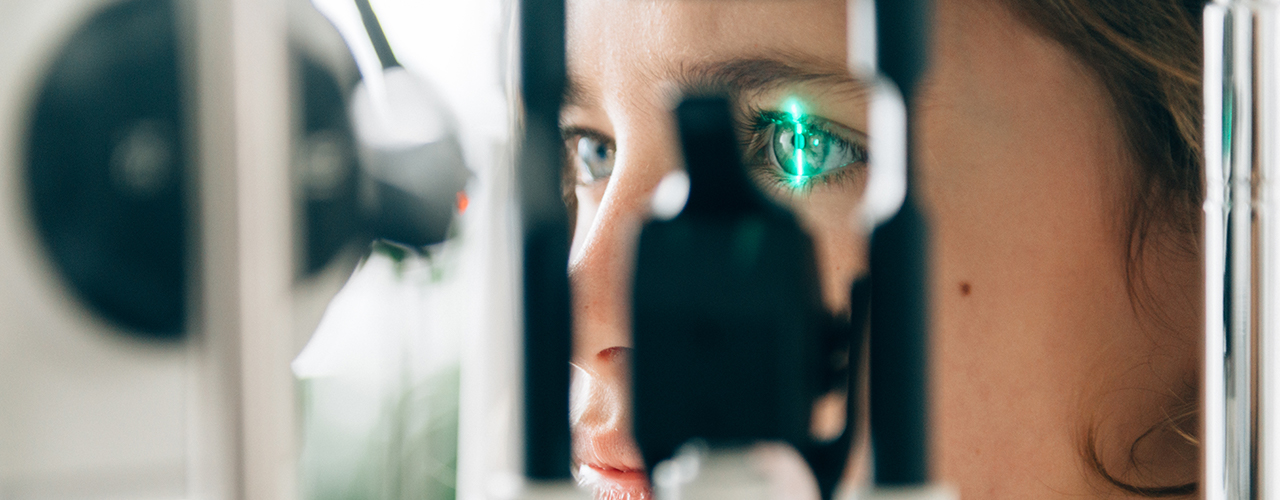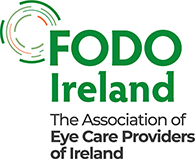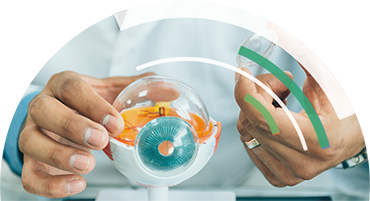Vision, the most valued sense
We depend on our vision for so many everyday activities - finding our way around our homes and outside, reading, driving or simply enjoying a beautiful view. That’s why surveys regularly report that vision is the sense people most value and most fear to lose.
So, it’s fortunate we live in a time where we can correct most vision problems, prevent many forms of sight loss and support people with permanent vision loss to live independently.
Learn more about
- Taking care of your eyes
- Having an eye examination
- Common eye problems and conditions
- Support for people with sight loss
The best way to look after your eyes is to have a regular eye examination as part of your general healthcare routine.
During your eye examination, a qualified eye care professional known as an optometrist will assess your vision and eye health. Most optometrists work with dispensing opticians in local opticians' practices.
In most cases, your local optician can provide you with all the support and care you need, but they also work with other eye health professionals for when you need that additional support.
Optometrists perform detailed eye examinations to detect defects in vision, ocular disease or other health issues. Many now also perform advanced diagnostic tests. There are over 867 optometrists registered with the health regulator CORU. Optometrists are the single largest group of eye care professionals in Ireland.
Dispensing opticians can fit and supply spectacles to children and adults, and some also dispense low vision aids and contact lenses. There are almost 199 dispensing opticians registered with CORU.
Ophthalmologists are medically trained doctors who specialise in eye health. They often do a mix of surgical and non-surgical work. The Irish College of Ophthalmologists currently has 140 members.
Orthoptists specialise in diagnosing and treating visual problems involving eye movements. Ophthalmologists usually refer to orthoptists where this is clinically indicated. There are currently 40 orthoptists working in Ireland.

The HSE advises that it is important to have a regular eye examination with your optician, and at least once every two years. An eye examination is necessary to check your eyes for common eye problems and conditions and to help optimise your vision.
In most cases, your journey will begin with a routine eye exam at your local optician, where the optometrist will assess your eye health and this will be sufficient to be sure that eyes are healthy and your vision good. However, if necessary, your optometrist can refer you to another eye care specialist or the hospital service if you need further assessment or treatment.
Prevention is better than cure. So, don’t wait until you have an eye problem before taking action as an early diagnosis of many common eye conditions can help prevent permanent sight loss. If you have not seen your eye care provider recently, take action today and book an eye examination or call for advice if anything does not seem right or is worrying you.
If you have a medical card or are eligible for the Treatment Benefit Scheme, you will get help towards the cost of your eye care.
- Medical card holders are entitled to a free examination and any necessary standard spectacles once every two years or more often if clinically necessary.
People eligible for a medical card can access the following
Eye care and optical appliances
- Free eye examination
- Standard spectacles as clinically necessary for no charge
Read more at Citizens Information, Optometric and ophthalmic services
- If you are eligible for the Treatment Benefit Scheme you are entitled to a free eye examination once every second calendar year and financial help towards the cost of spectacles or contact lenses.
If you are eligible for the Treatment Benefit Scheme, you can benefit from:
Eye care
Eligible patients benefit from the following for no charge:
- Standard eye examination
- Domiciliary eye examination (GP certification required re mobility)
- Examination with dilation
- Repeat examination as clinically necessary (max of three visits in frequency period).
Optical appliances
Spectacles
- €42.37 towards distance single vision (once every 2nd calendar year)
- 42.37 towards reading single vision (once every 2nd calendar year)
- €84.19 towards Bifocal/Varifocal complete appliances (once every 2nd calendar year)
Contact lenses
- €42.37 towards contact lenses (per pair)
- Half the cost of contact lenses prescribed on medical grounds, up to a maximum of €500.
Repairs
- You can also get help towards the cost of repairs. Speak to your local optician for more information.
Read the DSP overview to learn more about the scheme and how to qualify.
If you are not eligible for this support or need a sight test for VDU use or a driving licence, you can access eye care privately from your local eye health care provider.
You can find your local dispensing optician, optometrist and ophthalmologist using the links below. They can help you if you are eligible for the Treatment Benefit Scheme, and most of these eye care providers will also be able to meet your needs if you have a medical card or want to access private eye care services.
|
|
|
Common eye problems and conditions

Refractive error is the most common eye problem and results in blurred vision. Short-sightedness (myopia), long-sightedness (hyperopia) and astigmatism are all types of refractive error. Options for correcting these include spectacles, contact lenses or refractive surgery.
In children, an uncorrected refractive error can result in amblyopia, often referred to as ‘lazy eye’. This can result in reduced quality of life and impact on life choices, such as available career options. The good news is that with early diagnosis and treatment vision can often be improved and means that most children start life with better vision in both eyes.
Most other eye conditions are much more common in older age. These conditions include cataract, macular degeneration, glaucoma and diabetic eye disease.
Cataracts occur when the lens in our eye becomes less clear resulting in blurry vision. Cataracts in childhood are rare compared to age-related cataracts. Where necessary, surgery is a very effective and safe treatment for cataracts in most patients. Your local eye care experts will explain the risk and benefits of surgery so you can make an informed choice.
Macular degeneration is more common in people over the age of 50. It can affect central vision and make it more difficult to perform everyday tasks. There are two main types of macular degeneration – ‘dry’ and ‘wet’. The wet form requires urgent medical attention to minimise the risk of severe vision loss, so it is important to seek urgent advice and support if you have any symptoms of macular degeneration. If you have dry macular degeneration, your local optician can help you with ongoing advice and support. Learn more about macular degeneration.
Glaucoma causes damage to the optic nerve, which can result in irreversible loss of vision if left untreated. On the other hand, the early diagnosis and treatment of glaucoma can prevent sight loss in most cases. In the early stages of glaucoma, people are not aware their vision is reducing. That is why it is important to have regular eye examinations. This is even more important if you are in a higher risk group, for example, if you have a family history of glaucoma or are of African, Caribbean or Asian descent. Learn more about glaucoma.
Diabetes is now prevalent in the Western world and diabetic eye disease can result in vision loss. This is why it is important that everybody with diabetes has regular eye screening appointments and manages their blood sugar levels, blood pressure and cholesterol.
In most cases above, and with many other eye conditions, early diagnosis and the right support can help improve vision and eye health and prevent avoidable sight loss. That is why regular eye examinations are so important. Visit your optician for an eye examination regularly.
Support for people who have sight loss
If you have sight loss, you should still have regular eye examinations to check the health of your eyes and to ensure that your vision correction is optimised, so you get the best out of any assistive devices and technology. There are also charities and support groups that can support you, such as:
- NCBI (National Council for the Blind Ireland)
- Fight for Sight
- Fighting Blindness
- Irish Guide Dogs for the blind
If you have any questions or would like to suggest other resources for this page, please email us at [email protected] or call us on 01247 9972.

 Patients and public
Patients and public
 Policymakers
Policymakers
 Members
Members News and views
News and views

